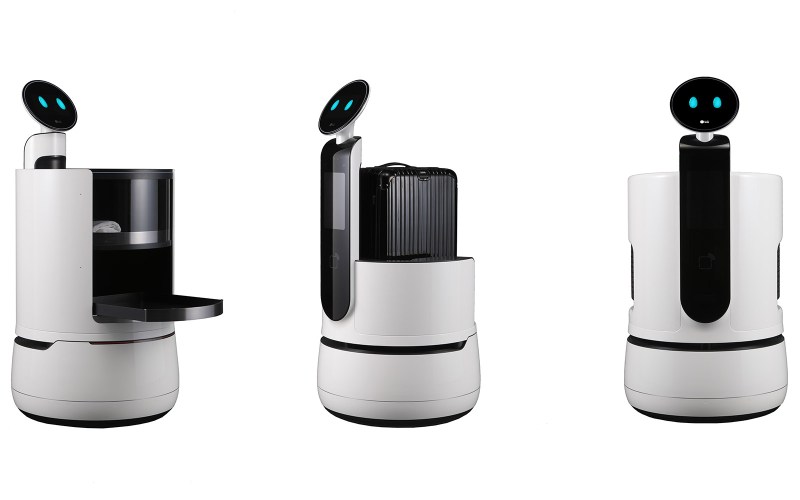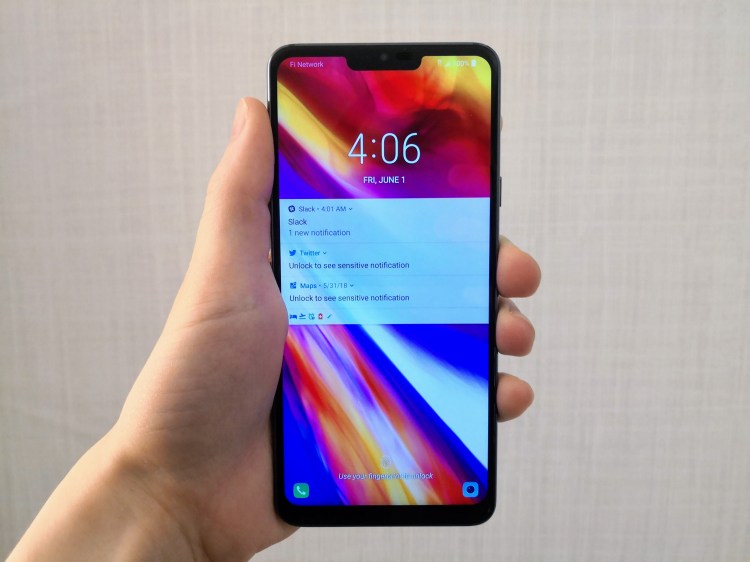Watch all the Transform 2020 sessions on-demand here.
LG makes a lot of products. So many, in fact, that the South Korean company’s nearly half-dozen subsidiaries — LG Electronics, LG Uplus, LG Innotek, LG Chem, and Zenith, to name a few — semi-autonomously handle research, development, testing, and manufacturing full stack. A sampling of the electronics in LG’s portfolio might include televisions, refrigerators, ovens, smartphones, home security cameras, computer monitors, and microwaves — and that’s just scratching the surface.
But there is one unifying thread in this vast array: artificial intelligence (AI).
About a year ago, LG announced DeepThinQ, an overarching AI platform designed for mobile devices, smart home products, and robotics solutions. A few months later, in June 2017, the company opened a lab in South Korea with the goal of bringing its research in computer vision, voice recognition, and natural language processing under one roof.
Building on that foundation, LG today announced a new AI research and development lab in Toronto, Canada, the company’s second in North America. (The first is in Santa Clara, California.) The lab will fuel innovative AI software and hardware startups, LG says, and draw on expertise from the University of Toronto, the beneficiary of a “multi-million-dollar” AI investment fund. Over the course of the next five years, university researchers and academics will have the opportunity to “work collaboratively” with LG’s U.S. and Canadian AI teams.
June 5th: The AI Audit in NYC
Join us next week in NYC to engage with top executive leaders, delving into strategies for auditing AI models to ensure fairness, optimal performance, and ethical compliance across diverse organizations. Secure your attendance for this exclusive invite-only event.
“We’re focusing on expanding our AI capabilities around the globe — in India, China, Japan, Finland, Russia, Europe, the U.S., Canada, and elsewhere,” Dr. I.P. Park, LG’s chief technology officer, told VentureBeat in an interview. “Our goal is to utilize AI and innovative software technologies to help our customers have the best experience possible.”
AI smartphones, televisions, and air conditioners
The LG G7 ThinQ, a smartphone embedded with AI smarts, is one result of the company’s AI-forward strategy. Its camera app automatically switches between different color and contrast filters in response to ambient lighting conditions, and its built-in machine learning models can detect more than 1,162 different objects (though in our testing, it doesn’t always get it right the first time).
Smartphones aren’t the only thing LG’s imbuing with AI smarts these days. Its InstaView ThinQ refrigerator has a digital display that shows contextually relevant information based on the time of day and — when paired with one of LG’s newer smart ovens — automatically preheats the oven for recipes selected from the fridge. It’s even self-diagnostic — if the compressor conks out or the fridge’s touchscreen quits working, LG says it will forward the logs to technicians in order to expedite repairs.
Yet another example of LG’s AI in action is its newest line of ThinQ-branded, WebOS-based televisions, which sport the company’s deep learning-optimized Alpha 9 processor. Microphones embedded in the TV remote pick up voice commands like “Show me the soundtrack to this movie” and “Turn off the TV when this show is over,” which the Alpha 9 interprets on the fly.
LG taps its in-house speech recognition platform, Voice Mate, for a few of those commands, but hands off any requests it can’t answer to the Google Assistant. It’s this platform-agnostic approach that differentiates LG from the competition, Park said.

Above: LG’s Voice Mate user interface.
“No matter how big the company is, the world is too complex and too diverse for any one company to tackle,” he said. “We’re happy to offer an external partner solution if it ensures customers get the best experience.”
Openness invariably comes at the cost of control, however — a risky position to take as particularly egregious examples of biased AI algorithms are coming to the fore. Researchers recruited by the Washington Post found that Amazon’s Alexa and the Google Assistant are 30 percent less likely to understand non-American accents, for example, and the American Civil Liberties Union found that on the default settings, Amazon’s Rekognition service misidentified 28 sitting members of Congress — particularly targeting individuals of color — as criminals.
Park acknowledged the importance of this issue and said that LG is taking steps to mitigate and minimize bias in its AI systems. In South Korea, he said, the company recently demonstrated a smart air conditioner — the DualCool ThinQ — with voice recognition tech that can accurately interpret words spoken by people from southern regions in South Korea, whose accent tends to be misunderstood by voice systems.
“We want to treat everyone equally in terms of accent capability,” Park said, “so we’re training our systems so that they’re more accurate and fairer.”
That goes double for privacy. LG has a dedicated product security response team and a policy of “opt-in,” rather than “opt-out” settings — it explicitly designs its product flows in such a way that customers aren’t forced to fork over data.
“We don’t collect personally identifiable data,” Dr. Park said. “If a customer wants a certain feature, they can enable it, but everything is switched off by default.”
Robots everywhere
LG may be busy conquering the smartphone, television, and appliance market with AI, but it has its sights set on a robotic future.
The company recently invested $5 million in store inventory automation startup Bossa Nova Robotics and two South Korean robotics firms, SG Robotics and Robostar. LG says that over the past year, it has funneled more than $90 million into autonomous machines.
“We’re developing robots across several industrial and consumer categories,” Park said.
There’s Hom-Bot, a robot vacuum cleaner that uses computer vision to recognize objects around a room and react accordingly. And at CES 2018 in January, LG took the wraps off of three concept robots under its CLOi brand: a server robot that can deliver food and drinks, a porter robot that can handle check-in and check-out services at hotels and transport luggage to rooms, and a grocer robot that informs customers of prices and specials and guides them through store aisles.

Above: LG’s CLOi concept robots.
One of the company’s largest-scale robotics deployments to date is at Incheon International Airport in Seoul, South Korea, where a fleet of LG custodial and guide robots scan boarding passes, offer directions, and tidy up areas in need of frequent cleaning. The latter can converse with passengers in four languages — Korean, English, Chinese, and Japanese — thanks to LG’s voice recognition platform.
Managing a fleet of robots in an airport is no small feat, Park said. “Incheon is one of the busiest airports in the world,” he explained. “Imagine a robot navigating that complex environment without interfering with or bumping into passengers. Thanks to our AI platform, it can move around on its own with full autonomy.”
But it’s worth the effort, he said. “It’s an encapsulation of [LG’s] mission: using AI and innovative technologies to help everybody. We’re aiming to create happier, better lives. AI is a means to this end.”


